Suchergebnisse
Energiemosaik Austria - Österreichweite Modellierung und webbasierte Visualisierung von Energieverbrauch und CO2-Emissionen auf Gemeindeebene
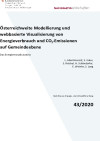
Inhalt des Projektes ist eine alle Nutzungs- und Mobilitätsarten umfassende Modellierung und webbasierte Visualisierung von Energieverbrauch und Treibhausgasemissionen aller österreichischen Gemeinden. Die Ergebnisse können in zahlreiche energie- und klimarelevante Handlungsfelder integriert und für die Sensibilisierung von Entscheidungsträgern und Öffentlichkeit genutzt werden.
Schriftenreihe
43/2020
L. Abart-Heriszt, S. Erker, S. Reichel, H. Schöndorfer, E. Weinke, S. Lang
Herausgeber: BMK
Deutsch, 56 Seiten
Downloads zur Publikation
Machbarkeitsanalyse zertifizierte Plus-Energie-Quartier-Sanierung des denkmalgeschützten Otto-Wagner-Areals (OttoWagner-ArealPlus)
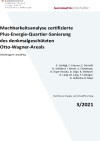
Entwicklung eines innovativen denkmalschutzverträglichen Sanierungskonzepts zur Transformation des Wiener Otto Wagner-Areals in ein Plus-Energie-Quartier. Das Jugendstil-Juwel umfasst eine Fläche von rund 50 Hektar, 70 Gebäude und eine Brutto-Grundfläche von rund 200.000 m². Der Lösungsansatz umfasst dabei höchste Energieeffizienz- und Komfortanforderungen.
Schriftenreihe
3/2021
K. Schlögl, C. Kresser, E. Schriefl, H. Schöberl, I. Artner, S. Chatterjee, D. Ürge-Vorsatz, D. Ürge, K. Stieldorf, F. Gharakhanzadeh, I. Stieldorf, G. Lang, M. Lang, T. Lebinger, G. Jedliczka, B. Mayr
Herausgeber: BMK
Deutsch, 162 Seiten
Downloads zur Publikation
Die CO2 neutrale Baustelle - Ein Beitrag zum Klimaschutz der österreichischen Bauwirtschaft
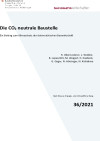
Identifikation aller auf Baustellen anfallenden direkten und indirekten CO2- bzw. THG-Emissionen. Analyse der Rahmenbedingungen und Technologien, um Möglichkeiten für deren Steuerung aufzuzeigen. Gleichzeitig wurden Mehrwerte wie beispielsweise Kosten- und Nutzen-Vorteile einer CO2-neutralen Baustelle aufgezeigt und quantifiziert.
Schriftenreihe
36/2021
R. Obernosterer, L. Winkler, B. Lepuschitz, M. Weigert, H. Daxbeck, G. Goger, N. Hörzinger, N. Kisliakova
Herausgeber: BMK
Deutsch, 119 Seiten
Downloads zur Publikation
Programme Evaluation of "City of Tomorrow" 2013 - 2021
This evaluation examined the effects that the "City of Tomorrow" programme has achieved since its inception. The evaluation is based on extensive surveys of research project participants and various multipliers from application areas such as civil engineering and urban planning. The evaluation thereby creates an important basis for the design of future research funding.
Urban district heating extended - Flexibilisierung und Dekarbonisierung urbaner Fernwärmesysteme
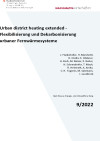
Entwicklung innovativer urbaner Fernwärmeversorgungssysteme durch Integration von Langzeitwärmespeicher, (Groß-)Wärmepumpe, solarthermische Großanlage, Abwärme und simulationstechnischer Analyse und Bewertung. Das Ergebnis dient als Vorbild für Technologieauswahl und Einsatzreihenfolge neuer urbaner Fernwärmeversorgungsgebiete.
Schriftenreihe
9/2022
J. Fladenhofer, H. Marchetti, H. Ondra, E. Höckner, H. Koch, M. Moser, P. Reiter, H. Schranzhofer, T. Mach, R. Heimrath, A. Arnitz, C. R. Tugores, M. Salzmann, I. Leusbrock
Herausgeber: BMK
Deutsch, 176 Seiten
Downloads zur Publikation
Highlights der Bauforschung
9. März 2023, ab 10:00 Uhr
Ankersaal, Kulturhaus Brotfabrik, Absberggasse 27/Stiege 3, 1100 Wien
Die „Highlights der Bauforschung“ gaben einen Richtungsweiser zum FTI-Schwerpunkt „Klimaneutrale Stadt“ und blickten auf 10 Jahre „Stadt der Zukunft“ zurück. Gleichzeitig wurden aktuelle Forschungsergebnisse aus Projekten von „Stadt der Zukunft“ und der internationalen Forschungskooperation IEA vorgestellt. Die Veranstaltung bildete den Auftakt zur zukünftigen Ausrichtung der nationalen Bau- & Gebäudeforschung im FTI-Schwerpunkt „Klimaneutrale Stadt“, der in den kommenden Monaten, wie skizziert, eine breite Diskussion über Themen und FTI-Fragestellungen führen möchte.
Energiespeicher Beton: Thermische Bauteilaktivierung. Planungsleitfaden Einfamilien- und Reihenhäuser
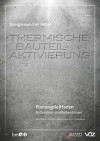
Im Planungsleitfaden "Heizen und Kühlen mit Beton" werden die Erkenntnisse bisheriger Forschungsprojekte zur Bauteilaktivierung zusammengefasst, es wird gezeigt, wie Energie in massiven Bauteilen über längere Zeit gespeichert und zu beliebigen Zeitpunkten wieder abgerufen werden kann. Der Planungsleitfaden ist mit detaillierten Anleitungen auf die Bedürfnisse von Planenden und Bauausführenden sowie auf die Wissensvermittlung zur Aus- und Weiterbildung konzipiert.
Felix Friembichler, Simon Handler, Klaus Krec, Harald Kuster
Herausgeber: BMVIT
Deutsch, 122 Seiten
Downloads zur Publikation
SOFC4City - SOFC-Abwärmenutzung für Gebäude und Industrie
Das hohe Abwärmetemperaturniveau der SOFC-Brennstoffzelle eignet sich prinzipiell um unterschiedliche Wärme- und Stromverbraucher (Wohnbau, Industriebetriebe, ...) bedienen zu können. Ziel ist es, die Abwärme der Brennstoffzelle auf mehreren Temperaturniveaus zur Verfügung zu stellen, um so die Vorteile der Brennstoffzelle besser zu nutzen und den Einsatz für den städtischen Bereich zu prüfen. Einerseits werden die rechtlichen und marktwirtschaftlichen Rahmenbedingungen dazu erhoben, anderseits wird die technische Ausführbarkeit mittels CFD-Simulationen der Wärmeauskopplung sondiert.
Dokumentation, Vergleich und Aufbereitung von Demonstrationsergebnissen zum Thema „Digitaler Gebäude Zwilling“
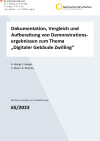
Ziel des Projekts war es, Ergebnisse aus zwei Demonstrationsvorhaben eines digitalen Gebäudezwillings miteinander zu vergleichen und erste Betriebserfahrungen zu dokumentieren.
Schriftenreihe
65/2023
D. Jähnig, F. Hengel, C. Moser, R. Pertschy
Herausgeber: BMK
Deutsch, 23 Seiten
Downloads zur Publikation
PhaseOut - Wärmepumpentechnologien in der Bestandssanierung
Ziel ist die Konzeption, Optimierung, Umsetzung, Demonstration und Bewertung von innovativen, minimalinvasiven Sanierungslösungen (thermische Sanierung und Heizungstausch) mit Wärmepumpen und PV im Geschoßwohnbau an sieben baugleichen Gebäuden. Es erfolgt ein umfänglicher Vergleich verschiedener technischer Lösungsvarianten auf Basis modularer und skalierbarer Gebäudetechniksysteme sowie multifunktionaler Gebäudekomponenten für den Austausch von dezentralen Gasetagenheizungen durch zentrale, semi-zentrale und dezentrale Wärmepumpen-Lösungen.
Ergebnisband „Urban Data Management“
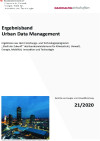
Der vorliegende Ergebnisband stellt abgeschlossene Projekte aus dem Forschungs- und Technologieprogramm „Stadt der Zukunft“ des Bundesministeriums für Klimaschutz, Umwelt, Energie, Mobilität, Innovation und Technologie (BMK) im Bereich Urban Data Management vor. Die gewonnenen Erkenntnisse sollen eine Entwicklung in Richtung energieeffiziente und klimaverträgliche Stadt unterstützen, die auch dazu beiträgt, die Lebensqualität und die wirtschaftliche Standortattraktivität zu erhöhen.
Schriftenreihe
21/2020
Redaktionelle Gestaltung: Bianca Pfefferer, Hannes Warmuth (ÖGUT)
Herausgeber: BMK
Deutsch, 24 Seiten
Downloads zur Publikation
Ergebnisband „Klimaneutrale Städte"
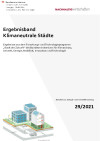
Der vorliegende Ergebnisband stellt abgeschlossene Projekte aus dem Forschungs- und Technologieprogramm „Stadt der Zukunft“ des Bundesministeriums für Klimaschutz, Umwelt, Energie, Mobilität, Innovation und Technologie (BMK) im Bereich Klimaneutrale Städte vor. Die gewonnenen Erkenntnisse sollen eine Entwicklung in Richtung energieeffiziente und klimaverträgliche Stadt unterstützen, die auch dazu beiträgt, die Lebensqualität und die wirtschaftliche Standortattraktivität zu erhöhen.
Schriftenreihe
29/2021
Redaktionelle Gestaltung: Bianca Pfefferer, Hannes Warmuth (ÖGUT)
Herausgeber: BMK
Deutsch, 22 Seiten
Downloads zur Publikation
Bewertung der Bauteilaktivierung als Option für Flexibilität im Strommarkt
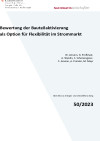
Um die Forschungsfrage dieser Studie nach dem zukünftigen Stellenwert der Bauteilaktivierung für die Energieversorgung zu beantworten, wurde ein Schätzmodell zum erwartbaren Neubau von Wohn- und Dienstleistungsbauten bis 2040 sowie der Sanierung von Bestandsbauten entwickelt.
Schriftenreihe
50/2023
W. Amann, G. Preßmair, A. Stipsits, S. Schoisengeier, C. Amann, A. Preisler, M. Mayr
Herausgeber: BMK
Deutsch, 75 Seiten
Downloads zur Publikation
Dialogforum "Klimaneutrale Stadt"
20. November 2023
Ankersaal, Brotfabrik, Absberggasse 27, 1100 Wien
Mit der Mission „Klimaneutrale Stadt“ unterstützt das Klimaschutzministerium in Kooperation mit dem Klima- und Energiefonds österreichische Städte dabei, durch Forschung und Entwicklung schneller klimaneutral zu werden. Pionierstädte gehen gemeinsam voran und entwickeln praxistaugliche, klimawirksame Lösungen für die Energie- und Mobilitätswende sowie die Kreislaufwirtschaft, die rasch umgesetzt und verbreitet werden sollen.
Ergebnisband „Gebäudetechnologien“
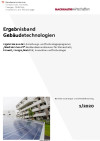
Der vorliegende Ergebnisband stellt abgeschlossene Projekte aus dem Forschungs- und Technologieprogramm „Stadt der Zukunft“ des Bundesministeriums für Klimaschutz, Umwelt, Energie, Mobilität, Innovation und Technologie (BMK) im Bereich innovativer Gebäudetechnologien vor. Die gewonnenen Erkenntnisse sollen eine Entwicklung in Richtung energieeffiziente und klimaverträgliche Stadt unterstützen, die auch dazu beiträgt, die Lebensqualität und die wirtschaftliche Standortattraktivität zu erhöhen.
Schriftenreihe
1/2020
Redaktionelle Gestaltung: Bianca Pfefferer, Hannes Warmuth (ÖGUT)
Herausgeber: BMK, Aktualisierung: Mai 2021
Deutsch, 25 Seiten
Downloads zur Publikation
Technologiereport: Digitalisierung der Bau- und Immobilienbranche
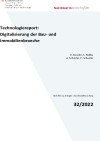
In der Vielzahl digitaler Möglichkeiten ist es nur sehr schwer möglich, einen Überblick zu behalten, Trends und Potentiale abzuschätzen sowie Zusammenhänge zu erkennen. Der vorliegende Report zielt daher darauf ab, den aktuellen Stand der Technik und die Markteinschätzung vielversprechender digitaler Technologien zu beschreiben. Es werden Informationen über konkrete Anwendungsfälle, Mehrwert und Herausforderungen der jeweiligen Technologien bereitgestellt. Die dargestellten Analysen dienen der Potentialbewertung und der strategischen Weichenstellung zur Integration der aktuell wichtigsten digitalen Technologien der Bau- und Immobilienbranche.
Schriftenreihe
32/2022
K. Künzler, S. Robbi, A. Schuster, P. Schuster
Herausgeber: BMK
Deutsch, 92 Seiten
Downloads zur Publikation
LINE-FEED - Plug-in Photovoltaik-Speicher für die Steckdose
Im Projekt LINE-FEED wurden Technologien entwickelt, die für einen Photovoltaik-Speicher benötigt werden, der von jedem Laien an einer gewöhnlichen Steckdose angeschlossen werden kann. Ziel war die Entwicklung eines Speichersystems für Haushalte in urbanen Räumen, welche selbst keine Möglichkeit der Installation einer Photovoltaikanlage haben.
LINE-FEED - Plug-in Photovoltaic Storage for the Wall Socket
The project LINE-FEED developed technologies that are required for a photovoltaic storage system which can be installed by anybody by simply plugging it into a wall socket. The aim was to create a storage system for households in urban areas that do not have the possibility to install a photovoltaic system themselves.
Dialog in Fokusgruppen: Scope „Klimaneutralität“ – Systemgrenzen und praktikable Ansätze in FTI Projekten
19. Jänner 2022, 13:00 - 15:00 Uhr
Online
Wie können wir Klimaneutralität auf Stadt- und Quartiersebene herunterbrechen und bewerten? Der Fokusgruppendialog befasste sich mit dem FTI-Thema der Bewertung von Klimaneutralität in Städten und Quartieren und lud zu einer Diskussion mit Expert:innen im Bereich der Forschung und der öffentlichen Verwaltung ein.
Climate-friendly buildings
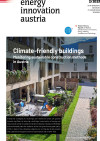
Monitoring sustainable construction methods in Austria
energy innovation austria
2/2023
Herausgeber: BMK in cooperation with the Climate and Energy Fund
Englisch, 12 Seiten
